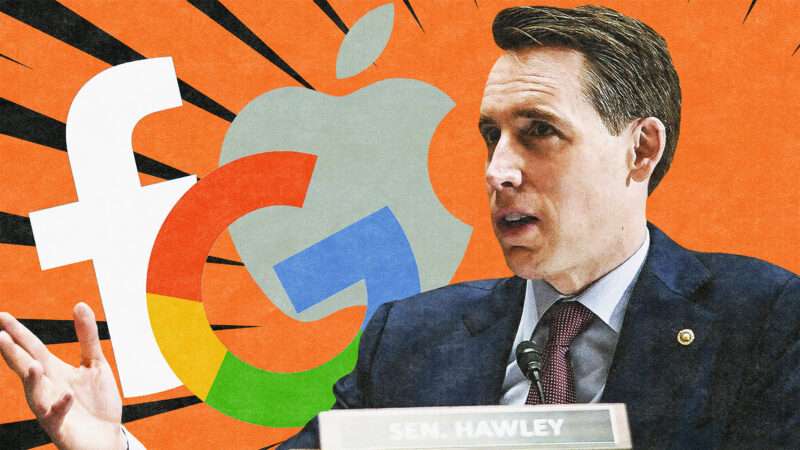4/16/1962: Justice Byron White takes oath.

from Latest – Reason.com https://ift.tt/3e9nDSY
via IFTTT
another site
4/16/1962: Justice Byron White takes oath.

from Latest – Reason.com https://ift.tt/3e9nDSY
via IFTTT

The year-plus of the pandemic has been an unpleasant experiment in just how far previously free-ish countries could be subjected to command-and-control systems without exciting rebellion and pushing them past the breaking point. The uncomfortable evidence is that many people willingly suffer massive impositions before resisting, though others chafe and are eager to resume some semblance of normal life. But how much damage has been done to children who have been at the mercy of officials who seized control and adults who failed to resist? In an era when every policy seems to be justified as “for the children,” pandemic lockdown pain is definitely something done to them.
“The coronavirus pandemic has been hitting adolescents hard,” science journalist Melinda Wenner Moyer noted last week in UnDark. “During the teen years, friendships matter more than almost everything else… But this year, teens have been forced to stay home and avoid real-world interactions with their friends. They have had to spend their days denied of their deepest needs while, in some cases, taking on more responsibilities — yet without many of the emotional supports they had in the past.”
“Rarely have America’s children suffered so many blows, and all at once, as during the pandemic’s lost year, Andrea Petersen reported in a similar piece for the Wall Street Journal. “The crisis has hit children on multiple fronts. Many have experienced social isolation during lockdowns, family stress, a breakdown of routine and anxiety about the virus.”
Both stories cite awful examples, and science supports the anecdotes.
“Posttraumatic, anxiety, and depression disorders are expected during and aftermath of the pandemic,” cautioned a September 2020 article in the International Journal of Disaster Risk Reduction. “Some groups, like children, have more susceptibility to having long term consequences in mental health.”
“[C]hildren’s depression ratings significantly increased during the lockdown, relative to 18 months beforehand,” found a November 2020 article on the results of lockdowns in the UK in the Archives of Disease in Childhood.
From April through October of 2020, emergency room visits in the United States for mental health reasons increased by 24 percent for kids 5- to 11-years-old, and by 31 percent for 12- to 17-year-olds, according to the Centers for Disease Control and Prevention.
Anecdotally, my wife, a pediatrician, has seen a huge surge in depression, anxiety, and self-harm in the months of the pandemic. Deprived of social interaction with classmates, teammates, and friends for a period of time that constitutes a significant percentage of their short lives, kids are falling apart. Too many of them are having suicidal thoughts in a world distorted beyond recognition and acceptability. And there’s no doubt as to the culprit.
“Pandemic life is not conducive to normal developmental events and this is having a significant impact,” comments Mamilda Robinson, a specialty director and clinical instructor of psychiatric mental health at Rutgers School of Nursing.
It didn’t have to be this way. During past pandemics, nobody ordered more-or less free societies to grind to a halt or tried to coerce their populations into isolation from one another. Weirdly, the public health professionals behind the lockdowns took their inspiration from totalitarian China, a country ruled by a government that espouses values entirely hostile to those of free societies.
“It’s a communist one party state, we said,” Professor Neil Ferguson, a prominent advisor to the British government on pandemic policy, told the Times of London in December. “We couldn’t get away with it in Europe, we thought… and then Italy did it. And we realised we could.” (UnHerd offers an unpaywalled summary.)
The result was that “[a]cross the world in 2020, citizens experienced the biggest rollback of individual freedoms ever undertaken by governments during peacetime (and perhaps even in wartime),” The Economist‘s Democracy Index 2020 observed of the world’s pandemic response. “The willing surrender of fundamental freedoms by millions of people was perhaps one of the most remarkable occurrences in an extraordinary year.”
“Willing” may be an overstatement about the reaction of those—in America and elsewhere—who protested and defied restrictions. It is certainly not an accurate characterization of the children who were dragged into an isolated and unnatural existence by adults.
And why were kids dragged into isolation that troubles even adults who have greater perspective and emotional resources when children are among those with the least vulnerability to COVID-19?
“Children, including very young children, can develop COVID-19,” according to information posted by the Harvard Medical School. “Many of them have no symptoms. Those that do get sick tend to experience milder symptoms such as low-grade fever, fatigue, and cough.”
Some children, especially those with underlying health conditions might get very sick. And there’s potential for them to pass the illness to those who are more vulnerable. But, as we’ve seen over the past year, children are especially endangered by isolation, the disruption of normal routine, and lack of contact with friends. They’re at much more risk from the lockdown policies implemented to fight the pandemic than they are from the virus itself.
A more rational response to the pandemic might have focused on offering protective measures to those at greatest risk from the disease, allowing adults to choose their own tradeoffs between risk and isolation. A rational approach would have certainly emphasized maintaining as much normality as possible for children and adolescents who need social contact with peers and friends in order to develop normally and happily.
The woefully regrettable authoritarian experiment of the past year will leave a mark on people’s sanity, prosperity, and relations with one another for years to come. It’s certainly going to leave an unpredictable, but probably unfortunate, legacy for the youngest among us for whom the pandemic will be a defining event in their lives. An apology isn’t enough; we need to restore pre-pandemic freedom for the children.
from Latest – Reason.com https://ift.tt/3dm0spa
via IFTTT

If you’re a science fiction fan who enjoys getting lost in internet rabbit holes, may I suggest the Historical Dictionary of Science Fiction? The site—newly revamped by Jesse Sheidlower, formerly of the Oxford English Dictionary and the Historical Dictionary of American Slang—offers definitions and tidy timelines for such terms as grandfather paradox. You can click through to see the pulpy pages where many of those phrases first appeared.
The updated dictionary’s big brag is that it contains more than 400 antedatings, or uses of words earlier than their previously established origins. Thought-controlled, once thought to have emerged in 1977, is now known to date back to 1934, for instance. And a use of graviton in 1929 establishes that what eventually became a real scientific term was coined first in science fiction.
from Latest – Reason.com https://ift.tt/3tnif4U
via IFTTT

If you’re a science fiction fan who enjoys getting lost in internet rabbit holes, may I suggest the Historical Dictionary of Science Fiction? The site—newly revamped by Jesse Sheidlower, formerly of the Oxford English Dictionary and the Historical Dictionary of American Slang—offers definitions and tidy timelines for such terms as grandfather paradox. You can click through to see the pulpy pages where many of those phrases first appeared.
The updated dictionary’s big brag is that it contains more than 400 antedatings, or uses of words earlier than their previously established origins. Thought-controlled, once thought to have emerged in 1977, is now known to date back to 1934, for instance. And a use of graviton in 1929 establishes that what eventually became a real scientific term was coined first in science fiction.
from Latest – Reason.com https://ift.tt/3tnif4U
via IFTTT

A man in the Philippines died after police forced him to do 300 squats for breaching a COVID-19 curfew. Darren Manaog Peñaredondo left his home to buy water. But he was caught by police and forced to perform exercises in punishment. Human Rights Watch says people violating COVID-19 restrictions in the Philippines are being abused, saying that officials locked five young people in a dog cage and have forced people to sit in the midday sun for breaking the rules.
from Latest – Reason.com https://ift.tt/3shU2vC
via IFTTT

A man in the Philippines died after police forced him to do 300 squats for breaching a COVID-19 curfew. Darren Manaog Peñaredondo left his home to buy water. But he was caught by police and forced to perform exercises in punishment. Human Rights Watch says people violating COVID-19 restrictions in the Philippines are being abused, saying that officials locked five young people in a dog cage and have forced people to sit in the midday sun for breaking the rules.
from Latest – Reason.com https://ift.tt/3shU2vC
via IFTTT

Sen. Josh Hawley’s recently unveiled “Trust-Busting for the Twenty-First Century Act” would ban most mergers and acquisitions between companies worth over $100 billion, stop tech companies like Amazon and Google from promoting their own products, and subject vertical mergers to antitrust laws.
The Missouri Republican says these steps are necessary to counter the power of “woke mega-corporations,” which he believes “control the products Americans can buy, the information Americans can receive, and the speech Americans can engage in.” In Hawley’s estimation, unregulated companies have “gobbled up our freedom and competition.”
Hawley’s comments aren’t surprising. He has previously called for banning such social media features as infinite scroll and autoplay videos, declaring them “exploitative and addictive.” He has also claimed that when Amazon uses third-party data to understand how better to market its own brands, it is violating antitrust law.
Hawley’s new legislation takes aim at “dominant digital firms,” defined as a website or service offered online with “dominant market power in any market related to that website or service.” It views many actions taken by such companies as inherently “unfair and deceptive,” and it would give the Department of Justice and the Federal Trade Commission the power to regulate those behaviors.
For example, dominant digital firms would be banned from promoting their search results without informing consumers they were doing so, and mergers and acquisitions made by companies with a market cap over $100 billion would be prohibited.
But that’s not Hawley’s most radical proposition. His bill stipulates that “no acquisition shall be presumed not to substantially lessen competition or tend to create a monopoly only because the parties to the acquisition do not compete directly against one another at the time of the acquisition.” This means vertical mergers (which occur between companies within the same supply chain that don’t necessarily compete directly) would be subject to the same level of review as horizontal mergers (which occur between companies in direct competition).
The government currently views vertical mergers fairly positively and has not subjected them to antitrust scrutiny. Since they tend to reduce production costs and to pass savings along to consumers, they create an efficiency that benefits markets.
Hawley’s bill would break with that tradition. This wouldn’t just drastically increase the number of corporate actions the government will be able to review; it would increase the potential for this power to be abused by officials with political rather than legal complaints. Former President Donald Trump reportedly attempted to pressure the Department of Justice into banning a vertical merger between Time Warner and AT&T because of his personal dislike for the way CNN (owned by Time Warner) covered him.
By increasing the number of actions the government can review and stop, Hawley’s bill not only increases the opportunities for future officials to derail perfectly harmless business activities; it runs the risk of bogging down commerce in regulatory processes. As the senator has noted, his bill would bar Amazon from adding new companies to its supply chain, a move that may hamper its ability to serve its consumers effectively.
Nor is this the only cause for concern. Hawley’s bill would also reduce the burden of proof needed for corporate behavior to be deemed anticompetitive.
Current antitrust law does not view monopolies as inherently damaging to competition: Only when companies collude to exclude competitors, or when a single competitor tries to use force to achieve a monopoly, is there a problem. Hawley’s bill would lower the burden of proof needed to prove a company is behaving unfairly. People alleging anti-competitive behavior would need only to show a preponderance of the evidence, and a plaintiff would not need to either “define the scope of a relevant market nor establish the share of such a market controlled by the defendant.” Essentially, a person alleging monopolistic behavior wouldn’t have to prove that a company actually had a dominant market share.
Further, it would not be up to an accuser to prove that a company’s behavior damages competition. It would be up to the accused company to prove that its behavior doesn’t damage competition. To beat an allegation, accused companies would have to show not only that their actions would increase competition but that they “could not obtain substantially similar procompetitive effects through commercially reasonable alternatives that would involve materially lower competitive risks.”
Hawley’s bill would also increase the cost of being found on the wrong side of the law: Companies found guilty of anti-competitive practices would forfeit all profits made from those actions.
The most troubling aspect of this legislation may be just how vague so much of it is. There is no real definition of what constitutes a “dominant” firm, even though businesses given this label are subject to scrutiny in many of their practices. This creates an opportunity for companies to abuse the Federal Trade Commission’s enhanced investigatory powers to hamper their competitors. Worse yet, it creates the possibility that politicians will use their unilateral power to punish business behaviors they personally don’t like.
from Latest – Reason.com https://ift.tt/3e7WQGE
via IFTTT

Sen. Josh Hawley’s recently unveiled “Trust-Busting for the Twenty-First Century Act” would ban most mergers and acquisitions between companies worth over $100 billion, stop tech companies like Amazon and Google from promoting their own products, and subject vertical mergers to antitrust laws.
The Missouri Republican says these steps are necessary to counter the power of “woke mega-corporations,” which he believes “control the products Americans can buy, the information Americans can receive, and the speech Americans can engage in.” In Hawley’s estimation, unregulated companies have “gobbled up our freedom and competition.”
Hawley’s comments aren’t surprising. He has previously called for banning such social media features as infinite scroll and autoplay videos, declaring them “exploitative and addictive.” He has also claimed that when Amazon uses third-party data to understand how better to market its own brands, it is violating antitrust law.
Hawley’s new legislation takes aim at “dominant digital firms,” defined as a website or service offered online with “dominant market power in any market related to that website or service.” It views many actions taken by such companies as inherently “unfair and deceptive,” and it would give the Department of Justice and the Federal Trade Commission the power to regulate those behaviors.
For example, dominant digital firms would be banned from promoting their search results without informing consumers they were doing so, and mergers and acquisitions made by companies with a market cap over $100 billion would be prohibited.
But that’s not Hawley’s most radical proposition. His bill stipulates that “no acquisition shall be presumed not to substantially lessen competition or tend to create a monopoly only because the parties to the acquisition do not compete directly against one another at the time of the acquisition.” This means vertical mergers (which occur between companies within the same supply chain that don’t necessarily compete directly) would be subject to the same level of review as horizontal mergers (which occur between companies in direct competition).
The government currently views vertical mergers fairly positively and has not subjected them to antitrust scrutiny. Since they tend to reduce production costs and to pass savings along to consumers, they create an efficiency that benefits markets.
Hawley’s bill would break with that tradition. This wouldn’t just drastically increase the number of corporate actions the government will be able to review; it would increase the potential for this power to be abused by officials with political rather than legal complaints. Former President Donald Trump reportedly attempted to pressure the Department of Justice into banning a vertical merger between Time Warner and AT&T because of his personal dislike for the way CNN (owned by Time Warner) covered him.
By increasing the number of actions the government can review and stop, Hawley’s bill not only increases the opportunities for future officials to derail perfectly harmless business activities; it runs the risk of bogging down commerce in regulatory processes. As the senator has noted, his bill would bar Amazon from adding new companies to its supply chain, a move that may hamper its ability to serve its consumers effectively.
Nor is this the only cause for concern. Hawley’s bill would also reduce the burden of proof needed for corporate behavior to be deemed anticompetitive.
Current antitrust law does not view monopolies as inherently damaging to competition: Only when companies collude to exclude competitors, or when a single competitor tries to use force to achieve a monopoly, is there a problem. Hawley’s bill would lower the burden of proof needed to prove a company is behaving unfairly. People alleging anti-competitive behavior would need only to show a preponderance of the evidence, and a plaintiff would not need to either “define the scope of a relevant market nor establish the share of such a market controlled by the defendant.” Essentially, a person alleging monopolistic behavior wouldn’t have to prove that a company actually had a dominant market share.
Further, it would not be up to an accuser to prove that a company’s behavior damages competition. It would be up to the accused company to prove that its behavior doesn’t damage competition. To beat an allegation, accused companies would have to show not only that their actions would increase competition but that they “could not obtain substantially similar procompetitive effects through commercially reasonable alternatives that would involve materially lower competitive risks.”
Hawley’s bill would also increase the cost of being found on the wrong side of the law: Companies found guilty of anti-competitive practices would forfeit all profits made from those actions.
The most troubling aspect of this legislation may be just how vague so much of it is. There is no real definition of what constitutes a “dominant” firm, even though businesses given this label are subject to scrutiny in many of their practices. This creates an opportunity for companies to abuse the Federal Trade Commission’s enhanced investigatory powers to hamper their competitors. Worse yet, it creates the possibility that politicians will use their unilateral power to punish business behaviors they personally don’t like.
from Latest – Reason.com https://ift.tt/3e7WQGE
via IFTTT

Body camera footage released Thursday shows a Chicago police officer shooting a 13-year-old boy who appeared to have his hands up. The victim, identified as Adam Toledo, was killed on March 29.
“Hey, show me your fucking hands!” the officer yells as he chases the teen down an alley. Toledo complies and is then shot. “Look at me, look at me. You all right?” the officer says. Toledo was later pronounced dead.
The video, embedded below, is graphic.
????WARNING GRAPHIC????
Bodycam footage of the police-involved shooting that killed Adam Toledo.
HE HAD HIS HANDS UP!
I will not be posting the rest of the video.
I am disgusted. pic.twitter.com/POTEmysDWY
— Natasha ⚯͛ (@ndelriego) April 15, 2021
Early that Monday morning, police were called to address eight gun shots—detected by the Chicago Police Department’s ShotSpotter technology—that went off in the Little Village neighborhood. Ruben Roman, 21, was seen on surveillance firing the rounds; when police arrived, Roman was arrested while Toledo fled.
Prosecutors initially suggested Toledo had a gun in his hand when the officer shot him, but the state’s attorney’s office walked that back today.
“An attorney who works in this office failed to fully inform himself before speaking in court,” said Sarah Sinovic, a spokesperson for the Cook County state’s attorney, according to Chicago’s WGN-TV. In a bond hearing for Roman, that attorney erroneously claimed that the cop told Toledo “to drop it as [Toledo] turns towards the officer. [Toledo] has a gun in his right hand.” That isn’t what the body camera footage shows.
In a press conference, Chicago Mayor Lori Lightfoot said that “there is no evidence whatsoever that Adam Toledo shot at the police.” She added that the officer “sprang into action to try to revive” the boy, and she asked for the city to remain calm.
The shooting follows Sunday’s fatal police shooting of Daunte Wright in Brooklyn Center, Minnesota. In that case, Officer Kim Potter says she mistook her taser for her gun before delivering the fatal shot. She immediately resigned and now faces second-degree manslaughter charges.
In 2020, 55 unarmed people were shot and killed by police, according to The Washington Post.
from Latest – Reason.com https://ift.tt/3mQadPy
via IFTTT
From the Florida Supreme Court today, an order signed by Chief Justice Canady and Justices Polston, Lawson, Muñiz, Couriel & Grosshans,
The Business Law Section of The Florida Bar recently adopted a policy regulating the composition of faculty at section-sponsored continuing legal education programs. Subject to certain exceptions, the policy imposes quotas requiring a minimum number of “diverse” faculty, depending on the number of faculty teaching the course.
The policy defines diversity in terms of membership in “groups based upon race, ethnicity, gender, sexual orientation, gender identity, disability, and multiculturalism.” The stated goals of the policy are “eliminating bias, increasing diversity and implementing tactics aimed at recruiting and retaining diverse attorneys.”
The Court recognizes and is grateful for the Bar sections’ important contributions to the legal profession in our state. And the Court understands the objectives underlying the policy at issue here. Nonetheless, certain means are out of bounds. Quotas based on characteristics like the ones in this policy are antithetical to basic American principles of nondiscrimination. Cf. Grutter v. Bollinger, 539 U.S. 306, 334 (2003) (“To be narrowly tailored, a race-conscious admissions program cannot use a quota system ….”); Regents of University of Cal. v. Bakke, 438 U.S. 265, 307 (1978) (numerical goal or quota “must be rejected” as “facially invalid”). It is essential that The Florida Bar withhold its approval from continuing legal education programs that are tainted by such discrimination.
Accordingly, rule 6-10.3(d) of the Rules Regulating the Florida Bar, which governs course approval for continuing legal education, is amended [to add the text,] {“The board of legal specialization and education may not approve any course submitted by a sponsor, including a section of The Florida Bar, that uses quotas based on race, ethnicity, gender, religion, national origin, disability, or sexual orientation in the selection of course faculty or participants.”} …
Justice Lawson, who joined the majority opinion, adds this:
I write separately to further express my support for what I view as the well-intended motivation underlying the decision of The Florida Bar’s Business Law Section to adopt a policy aimed at meaningfully broadening participation in the instructor pool for its educational offerings.
At this Court’s direction, both the Bar and the State Court System have for many years worked diligently to assure a system of justice that is fair for all and that treats all individuals as equal under the law. This Court is steadfast in its firm commitment to these ideals. I believe that these ideals are best advanced when individuals with very different backgrounds and experiences work together. This is because our experiential differences often result in starkly different modes of thought and perception—including deeply divided perceptions surrounding concepts as facially straightforward as “fairness” and “justice.”
It is when those who perceive and think differently come together in an environment of mutual respect and genuine concern for the well-being of others that we can best gain the understanding necessary to fully advance the ideals underpinning our judicial system. It is essential that we continue this work, and I am grateful to the Bar and its sections for their continued pursuit of these core ideals that are central to further advancing the cause of freedom for all, secured for all through the rule of law.
Justice Labarga dissents:
Because I do not believe that the enactment of a rule specifically addressing this issue is necessary, I dissent. I believe that a simple letter directed to the Business Law Section, communicating that such action may be in violation of United States Supreme Court precedent, would have sufficed. See e.g., Grutter v. Bollinger, 539 U.S. 306, 334 (2003); Regents of Univ. of Cal. v. Bakke, 438 U.S. 265, 307 (1978).
from Latest – Reason.com https://ift.tt/3ahezKF
via IFTTT